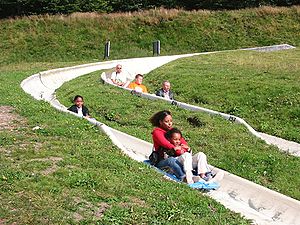Recreation: Difference between revisions
m Reverted edits by 74.103.99.143 to last revision by 71.236.132.119 (HG) |
Alustgarten (talk | contribs) |
||
| Line 8: | Line 8: | ||
==Recreation as a career== |
==Recreation as a career== |
||
Becoming a recreation specialist often requires a [[bachelor of arts]] degree in recreation management. A recreation specialist would be expected to meet the recreational needs of a community or assigned interest group. People with such degrees work in parks and recreation centers in towns, on community projects and activities. Networking with instructors, [[budgeting]], and evaluation of continuing programs are common job duties. Most U.S. states have a professional organization for [[continuing education]] and [[professional certification|certification]] in recreation management. The [[National Recreation and Park Association]] administers an examination called the CPRP (Certified Park and Recreation Professional) that is considered a national standard for professional recreation specialist practices.<ref>{{cite web|url=http://www.nrpa.org/content/default.aspx?documentId=1070|title=CPRP Exam|publisher=National Recreation and Park Association|date=2007|accessdate=2007-06-14}}</ref> |
Becoming a recreation specialist often requires a [[bachelor of arts]] degree in recreation management. A recreation specialist would be expected to meet the recreational needs of a community or assigned interest group. People with such degrees work in parks and recreation centers in towns, on community projects and activities. Networking with instructors, [[budgeting]], and evaluation of continuing programs are common job duties. Most U.S. states have a professional organization for [[continuing education]] and [[professional certification|certification]] in recreation management. The [[National Recreation and Park Association]] administers an examination called the CPRP (Certified Park and Recreation Professional) that is considered a national standard for professional recreation specialist practices.<ref>{{cite web|url=http://www.nrpa.org/content/default.aspx?documentId=1070|title=CPRP Exam|publisher=National Recreation and Park Association|date=2007|accessdate=2007-06-14}}</ref> |
||
Tori does not have fun. Fun has tori xD |
|||
==Examples== |
==Examples== |
||
Revision as of 01:43, 19 April 2010

Recreation or fun is the expenditure of time in a manner designed for therapeutic refreshment of one's body or mind. While leisure is more likely a form of entertainment or sleep, recreation is active for the participant but in a refreshing and diverting manner. As people in the world's wealthier regions lead increasingly sedentary lifestyles, the need for recreation has increased. The rise of so called active vacations exemplifies this.
Recreation as a career
Becoming a recreation specialist often requires a bachelor of arts degree in recreation management. A recreation specialist would be expected to meet the recreational needs of a community or assigned interest group. People with such degrees work in parks and recreation centers in towns, on community projects and activities. Networking with instructors, budgeting, and evaluation of continuing programs are common job duties. Most U.S. states have a professional organization for continuing education and certification in recreation management. The National Recreation and Park Association administers an examination called the CPRP (Certified Park and Recreation Professional) that is considered a national standard for professional recreation specialist practices.[1]
Tori does not have fun. Fun has tori xD
Examples

Practicing or appreciating:
- Art
- Computer games
- Cycling
- Dancing
- Drawing
- Eating and drinking
- Going to the beach
- Hobbies
- Humor: jokes, riddles, anecdotes
- Hunting and fishing
- Kite flying
- Music
- Partying
- Martial arts
- Pet ownership
- Reading a book
- Sledding
- Shopping
- Singing
- Spending time with friends and loved ones
- Sports and exercise
- Surfing the web
- Travel and tourism
- Using the internet
- Video games
- Visiting an amusement park
- Watching movies
- Watching TV
- Writing
- Yoga
- Painting
- Massaging
In recent years, more extreme forms of recreation have received more attention, such as skiing, snowboarding, bungee jumping, sky diving, hang gliding, paintball, rock climbing, backpacking, canyoning, caving, BASE jumping, adventure tourism and motor sport.
See also
References
- ^ "CPRP Exam". National Recreation and Park Association. 2007. Retrieved 2007-06-14.
